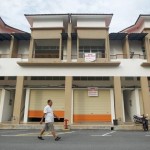Kuala Lumpur City Hall (DBKL) has been ordered by the Cabinet to stop accepting and approving the construction of new offices, serviced apartments, upscale condos and shopping malls costing over RM1 million in the capital.
The freeze order took effect on 1 November 2017, while existing applications need to get their planning permission next January, including those with changes made to building plans that have obtained development orders.
According to Federal Territories Minister Tengku Adnan Tengku Mansor, the moratorium could last from one to three years depending on the market’s condition.
“This will be temporary until we can clear all the excess supply,” said Second Finance Minister Johari Abdul Ghani.
“There is a stark imbalance between supply and demand and we have to review the strategy in real estate development as we do not want such a situation to adversely affect the economy.”
Johari revealed that the cabinet took this step after closely examining Bank Negara Malaysia’s (BNM) June report on the country’s oversupply of properties.
However, Johari said that Federal Government will continue to encourage the construction of low-cost residential properties, especially those costing under RM300,000.
“In this sector, there is a disparity between the 48 percent demand for affordable homes and the supply that only meets 28 percent of that. This is the area that needs to be addressed swiftly.”
Under the 2018 Budget, Prime Minister Najib Razak earmarked about RM2.2 billion to build 248,000 additional affordable dwellings.
In its latest report published on Friday (17 November), BNM warned that the number of unsold houses in Malaysia had reached a record level of 130,690 units in Q1 2017.
This is not only the highest in ten years but surpasses the historical average of 72,729 units per annum from 2004 to 2016. Dwellings costing more than RM250,000 also accounted for 63 percent of these properties.
By proportion, Johor reported the largest number of unsold units across the country at 27 percent, followed by Selangor (21 percent), Kuala Lumpur (14 percent), and Penang (8 percent).
Meanwhile, the central bank forecasted that the vacancy rate of office and retail premises in major metropolitan areas will increase significantly.
Citing data from Knight Frank, it warned that vacancy levels of office space in Klang Valley have already hit 23.6 percent during the first quarter and this could rise further to 32 percent by 2021.
Furthermore, BNM Governor Tan Sri Muhammad Ibrahim argued that a population of 32 million cannot sustain such high number of shopping complexes, as 140 new malls are targeted for completion in Klang Valley, Penang and Johor by then.
This means the country is not only facing a supply glut of pricey homes and commercial properties, but there are also not enough affordable dwellings being built, said the central bank in its latest quarterly bulletin.
“This situation could worsen if the current supply-demand conditions persist. As such, it is timely for all parties to act now to mitigate any potential risks to macroeconomic and financial stability.”
Otherwise, this could negatively impact Malaysia’s economy and lead to a downturn far worse than the 1997 Asian Financial Crisis. In particular, Johor is the most worrying as it has the highest surplus of unsold houses and retail space.
Image sourced from FMT.
This article was edited by the editorial team of PropertyGuru. To contact them about this or other stories email editorialteam@propertyguru.com.my
For the latest property news, trends, resources and expert opinions, visit our Property News section. Home buyers, sellers or property renters looking for Malaysian Properties, may like to visit the New Launches or Project Reviews page.



